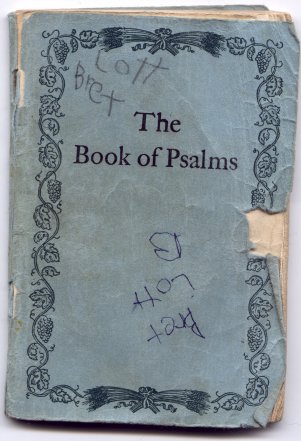
I am sitting in the sanctuary, a few rows from the front, to my left my mom and dad, my little brother Timmy in Mom’s lap and sleeping, to my right my older brother Brad. Brad and I have just received these thin blue books, every kid in the service passed a brand new copy by men in gray or black suits standing at either end of the pews, stacks of these books in hand.
The blue paper cover is bordered with green grapevines, tendrils working up and down either side with bunches of grapes here and there; at the top and bottom of the cover those tendrils meet sheaves of wheat in the same green ink.
The pastor says it is the book of somms, and I wonder what that is, look at the words in black ink centered a little high on the cover. I sound out the words to myself, The Book of, and stop.
P-S-A-L-M-S. How does that, I wonder, spell out Somms?
But even if I don’t understand, this is the first Bible — or piece of it — I have ever gotten, and I don’t want to lose this book. I want to keep it.
So I take one of the nubby pencils from the back of the pew in front of me, nestled in its tiny wooden hole beside the wooden shelf where attendance forms are kept, and beside the larger holes where the tiny glass cups are placed once we’ve emptied them of grape juice.
And I begin, for the first time in my life, to write my name by myself.
I start at the upper left hand corner, just below the border, but the first word trails off, falls toward that centered title in black as though that title is a magnet, the letters I make iron filings. They fall that way because there are no lines for me to balance them upon, as I am able to do with the paper given me by my kindergarten teacher, Mrs. Pasley.
I finish that first word, feel in my hand the cramp of so much strenuous, focused work, and hold the book away from me, look at it while the pastor rolls on.
There is no place for the second word, I see, the last letter of my first name too near the first of the title.
This is a problem. I know the second word must follow the first on the same line, a little space needed between them. Mrs. Pasley would not approve. This is a problem.
But there is space above my name due to its falling away, a wedge of blue field that might, if I am careful enough, be able to hold that second word, and I write, work out the riddle of letters without lines, letters that will line up to mark this book as mine, and mine only.
Then I am finished, and here is my name. Me.
The first time I have ever written my name myself, alone.
Later, on the way home, my older brother Brad will look at the book, say, “Lott Bret. Who’s that?” and laugh at my ill-spaced effort. Later still I will write my name again on the cover, this time with a blue pen and holding the book upside down. The words will be a little more jaunty, full of themselves and the confidence of a kid who knows how to write his name, no problem at all. Beneath this second round, though, will be the lone letter B, a practice swing at making that capital letter as good as I can make it.
Later, I will be baptized into the church at age fourteen, a ritual it seems to me is the right thing to do.
Later still, in college, I will be born again, as Christ instructed Nicodemus.
And later even still, I will have written entire books of my own, created lives out of the whole cloth of the imagination. I will have created, and created in my name.
But on this Sunday, the pastor still rolling on, these two words themselves are enough.
Only a kid’s scrawl. My own small imitation of God.
Bret Lott is author of the novels: The Man Who Owned Vermont, A Stranger’s House, Jewel, Reed’s Beach, and The Hunt Club; the story collections A Dream of Old Leaves, and the memoir Fathers, Sons and Brothers. His short stories and essays have been widely anthologized, and have appeared in such journals as The Yale Review, The Iowa Review, Gettysburg Review, Story, The Chicago Tribune, and The Southern Review. He has taught creative writing for twelve years at the College of Charleston, where he is a writer-in-residence and a professor of English.
